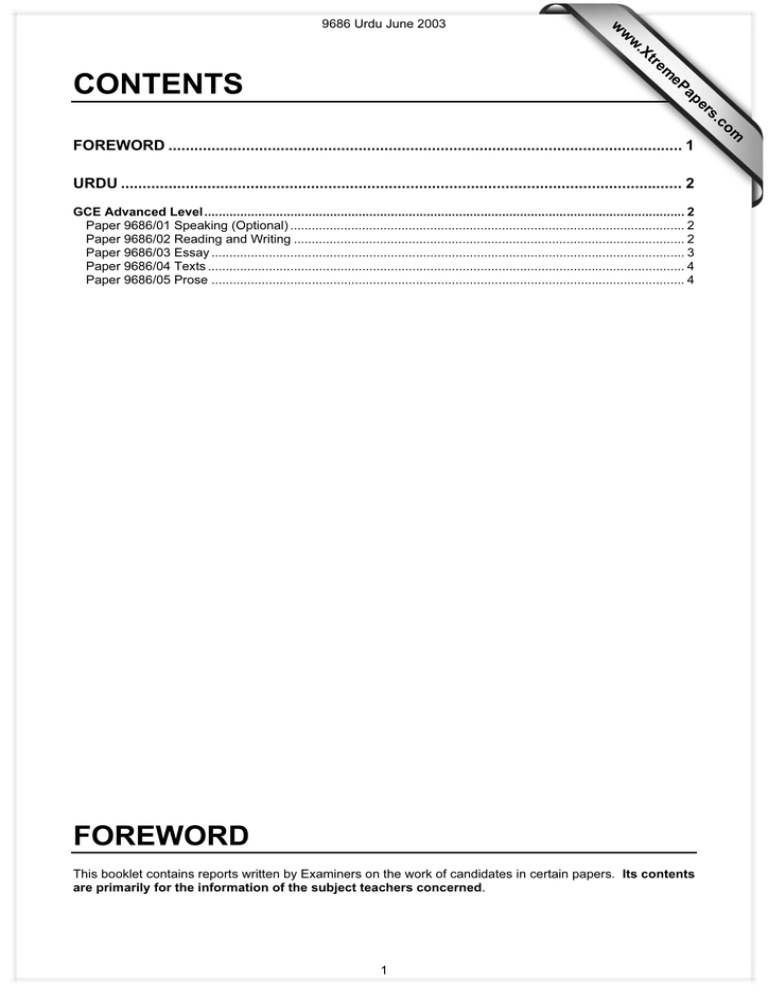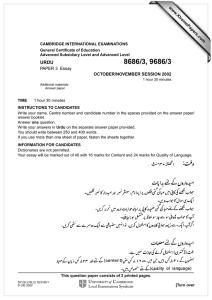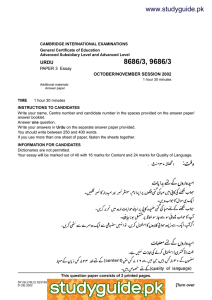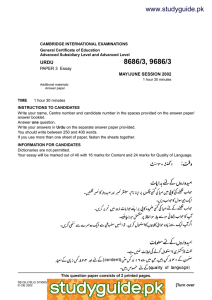www.XtremePapers.com
advertisement

w w 9686 Urdu June 2003 ap eP m e tr .X w URDU .................................................................................................................................. 2 GCE Advanced Level ...................................................................................................................................... 2 Paper 9686/01 Speaking (Optional) .............................................................................................................. 2 Paper 9686/02 Reading and Writing ............................................................................................................. 2 Paper 9686/03 Essay .................................................................................................................................... 3 Paper 9686/04 Texts ..................................................................................................................................... 4 Paper 9686/05 Prose .................................................................................................................................... 4 This booklet contains reports written by Examiners on the work of candidates in certain papers. Its contents are primarily for the information of the subject teachers concerned. 1 om .c s er FOREWORD ....................................................................................................................... 1 9686 Urdu June 2003 GCE Advanced Level Paper 9686/01 Speaking (Optional) General comments The overall level of performance was very high. Most candidates were very well prepared and the quality of examining was impressive. In all cases, appropriate informality was created in which candidates seemed to flourish. Fluency, good pronunciation, command of grammar (especially of inflexions and tenses), were all in evidence. Teachers/Examiners, on the whole, examined well in these situations and assessed candidates performance accurately. It is important that candidates are encouraged to express their opinions and emotions and to respond adequately and appropriately to the question ‘why?’ without the necessity of being repeatedly prompted. Administration Centres are to be congratulated on getting the tapes and paperwork to CIE in good condition with all the relevant forms filled in correctly. Overall Finally, there were some very good examples of Teachers/Examiners using this component as an extension and a development (not a repetition) of the topics and items tested at this level, leading candidates to express opinions, etc. This clearly benefited candidates of all standards. Paper 9686/02 Reading and Writing General comments On the whole this Paper was done well by the majority of candidates who appeared to have been well prepared for the examination and had a good grasp of the vocabulary required to tackle the Paper. The demands of the Paper were very similar to those of last year. Comments on specific questions Question 1 This required candidates to write their own sentences illustrating clearly the meanings of words taken from the first text. This was mostly well done with most candidates scoring 4 out of 5 marks. Question 2 This required candidates to give the opposite of 5 given words. Most candidates scored 4 or more marks. 2 9686 Urdu June 2003 Question 3 The five questions in this section were based on the given text in passage A. Responses to these questions were mostly concise and expressed in candidates own words in accordance with the instructions in the rubric. Candidates who answered in their own words achieved better marks than those who did not. Question 4 As in Question 3 candidates were required to write responses to five questions based on passage B. Most candidates displayed an excellent comprehension of the text but some let themselves down by not following the rubrics. Most candidates understood the text and the questions, but the quality of their responses were very varied. Five marks were available for linguistic accuracy and most candidates scored 3 or more because a high proportion of them wrote excellent Urdu, however, those who used little of their own language and expression could not receive full marks for language. Question 5 This last question required candidates to write a response to a question referring to both texts and to give their opinion on a question arising from the texts. The majority of candidates responded well to the task yet many tended to write responses that were well over 200 words. It is important for candidates to focus on the quality of their response and to keep to the word limit. Marks are awarded for candidates’ ability to express their views and ideas in an interesting way and from a personal point of view. Paper 9686/03 Essay General comments The standard of essays written by most of the candidates was good, and some were excellent. This year’s Paper was considered to be no more or less difficult than last winter’s Paper and the overall standard of performance was equally high. Comments on the essays There are six general topic areas set every year and for each topic area there is an essay title given underneath. Unfortunately, a handful of candidates did not understand the rubric and wrote compositions on the general topic headings rather than the specific essay titles and consequently could not achieve the highest marks. The examination produced a wide range of performances from the very ordinary to the excellent. The standard of written Urdu is almost always adequate at this level. The weakest essays do contain spelling errors, a narrow vocabulary and weak syntax, but essays containing many serious language errors are rare. Most marks are lost in the layout and organisation of the essays. Planning, structure and argument are vital components of essay writing, and although it is not necessary for candidates to write planning notes, many candidates do so, and those who did tended to produce better compositions. Most candidates managed to write within the prescribed limit of 250-400 words. It cannot be stressed too much that quantity does not equal quality and that long essays in excess of the word limit cannot gain further marks. This year’s most popular title by far was “tandurusti hazar nemat hai” – “health is the greatest blessing” which comprised about half the entries. This topic produced some interesting responses, but many were rather stereotyped responses to a familiar well known saying. A large proportion of the essays on this topic tended to concentrate on the ‘if you aren’t healthy, you are good for nothing’ aspect. There was much written about diet and exercise, a lot of which was repetitive and lacked structure. The second most popular title was “Mushtarika Khandani nizam ke bare men logon ka rijhan” – “The trend among people towards joint family systems”. While there were some very good and interesting compositions on this topic there were rather too many straightforward descriptive accounts of the system and how good it was. At this level there needs to be a more critical evaluation of the subject. 3 9686 Urdu June 2003 Probably the best written essays were on the topic of: “Qanun ki nazar sab barabar hain” – “Everyone is equal in the eyes of the Law”. This produced some excellent essays which introduced what the concept of the law is, discussed its ‘ideal’ position, some bemoaned a lack of law in Pakistan, and gave vivid and highly appropriate examples of their points, concluding with a summary paragraph giving their verdict. There were some weaker essays without much evidence of planning or structure. Paper 9686/04 Texts General comments The majority of candidates tackled this Paper well and showed that they understood the main ideas from the texts. Only a very few candidates showed evidence that they had not finished the Paper in the time allocated. All the questions were answered by some candidates, the most popular choices were Tobah Tek Singh, Shatranj kay Khilari and Umraao Jan Ada. There were some candidates who produced excellent scripts, showing detailed knowledge of the texts, and a thorough understanding of how the author conveys the message of the work. They were able to select and manipulate the material of the texts and express their ideas well in Urdu. There were many candidates however, whose knowledge of the recommended texts was superficial. In order to gain good marks it is essential that candidates have a thorough and detailed knowledge of the texts. Most scripts were well presented but some were difficult to read because of poor presentation. This was not only a question of poor handwriting but also of general layout. Some crammed their answers into the smallest space possible, then proceeded to cross out and make scribbled corrections, making it very difficult to get a clear picture of their answer. Also, far too many candidates did not adhere to the word limit for each task and gave too long answers, most of which tended to deteriorate in terms of quality of content, structure of their argument and language. Paper 9686/05 Prose General comments This English to Urdu translation passage was within the common experience of most candidates. It was about a teenager’s attitude towards her work at school. The performance of the majority of candidates was from very good to excellent. Comments on specific questions In this examination, there is one passage for translation from English into Urdu. The following words and phrases were the ones which candidates found most challenging and made the difference between adequate and good translations: ‘argument’, ‘head teacher’, ‘written home complaining’, ‘below standard’, ‘furious’, ‘kicked’ and ‘definitely not my thing’. Other common difficulties and mistakes in translation were: ‘unsatisfactory’, ‘hanging around with friends’, ‘bad influence’, ‘pebbles’, ‘had a go at me’, ‘having a good time with my friends’, ‘being young is all about’ and ‘definitely not my thing’. There were some spelling mistakes made in writing commonly known, simple words. Such simple mistakes should be avoided at this level of examination. Marks are given for translation of phrases and sentences which make good sense within the context of the given passage. Merely literal translations do not help in achieving this goal. 4


